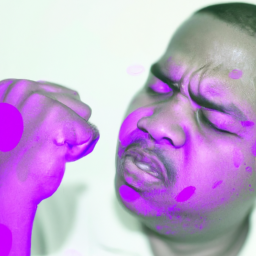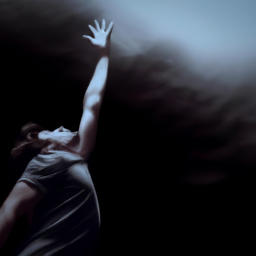Have you ever found yourself in a dream where you try to defend yourself but your punches feel weak and ineffective? I definitely have, and it can be quite frustrating.
But why does this phenomenon occur? Why do we feel like we’re moving through molasses when we try to punch or run in our dreams?
According to some experts, there are a few different factors at play. One of the biggest reasons why we punch so slowly in our dreams is because we lack physical sensation. In other words, our brains aren’t able to simulate the feeling of movement and force in the same way that they can when we’re awake. As a result, our movements can feel sluggish and uncoordinated.
But this is just one piece of the puzzle. In the following article, we’ll explore other potential explanations for this curious dream phenomenon.
Key Takeaways
- Lack of physical sensation and inaccurate simulation of physical movements in the brain make punches slow in dreams.
- The brain’s inability to fully activate muscles, accurately predict physical impact, simulate physical resistance, and prioritize other functions during sleep contribute to feeling of slowness or weakness in dream punches.
- Muscle memory plays a role in dream movements, but altered reality in dreams affects the way muscles move.
- Poor sleep quality can compromise muscle memory and result in slower reaction times and decreased motor function.
Explanation of the Phenomenon
So, why do I punch so slow in my dreams? Let’s break it down.
The main reason is that our dream state is different from our waking state. When we’re asleep, our brain isn’t receiving the same signals as it does when we’re awake. This means that our physical movements, such as punching, aren’t as sharp or precise as they would be in reality.
In dreams, our movements are often sluggish and lack the same level of control that we have when we’re awake. Another reason why we may punch slow in our dreams is the lack of physical sensation. When we’re awake, we can feel the weight of our body, the resistance of the air, and the impact of our punch. However, in dreams, we don’t experience these sensations in the same way.
This lack of physical feedback can make it difficult to gauge the speed and power of our punches. Instead, our movements may feel weak or uncoordinated. With this in mind, it’s no wonder why we often struggle to throw a quick and powerful punch in our dreams.
Lack of Physical Sensation in Dreams
Despite the absence of physical sensations in our dreams, we are still able to experience emotions and engage in activities. This is because our brain is able to create a simulation of reality that is convincing enough for us to believe it is real. However, this simulation is not perfect and lacks the ability to accurately simulate physical movements, such as punching.
This is why we may feel as though we are punching in slow motion or not at all. The brain’s inability to simulate physical movements is due to the fact that it is not receiving the same feedback it would receive in waking life. In real life, our muscles and joints provide a constant stream of sensory information to the brain, allowing it to accurately simulate movements.
However, in dreams, this feedback is absent, resulting in a less accurate simulation of physical movements. As a result, we may feel as though we are moving slower or not at all in our dreams.
The Brain’s Inability to Simulate Physical Movements
You may have noticed that your movements in dreams feel different than in real life, and this is because the brain can’t accurately simulate physical sensations. This includes the speed and force of punches.
Here are some possible reasons why:
- The brain isn’t able to fully activate the muscles needed for a punch
- The brain isn’t able to accurately predict the physical impact of a punch
- The brain isn’t able to accurately simulate the physical resistance of the air or the target
- The brain may prioritize other functions, such as memory consolidation, during sleep
These factors can contribute to the feeling of slowness or weakness in dream punches. However, there may also be psychological factors at play that affect the perception of dream movements.
As I delve into the psychological factors that affect dream movements, it’s important to note that the brain’s inability to simulate physical movements accurately is still a significant factor. However, emotions, beliefs, and past experiences can also influence the way we perceive our movements in dreams.
Psychological Factors
Hey, have you ever noticed how your dream movements can feel a little different depending on your emotions, beliefs, and past experiences?
It’s not uncommon to experience slower punches or weaker kicks in your dreams, and psychological factors may play a significant role in this phenomenon. Anxiety, fear, or a lack of confidence may affect your dream movements and make them feel less powerful than they would in reality.
For example, if you’ve been in a physical altercation before and felt powerless or scared, your brain may remember that experience and reflect it in your dream movements. Similarly, if you lack confidence in your physical abilities, your dream movements may feel slow or weak.
The good news is that by addressing these psychological factors in your waking life, you may be able to improve your dream movements and feel more confident and powerful in your dreams.
This leads us to the role of muscle memory in dream movements.
The Role of Muscle Memory
Now, imagine yourself effortlessly performing a complicated dance routine in your sleep. You’re moving smoothly and gracefully, with every step and turn executed flawlessly. This is all possible because of muscle memory.
Muscle memory is the ability of our muscles to remember repetitive movements and perform them without conscious effort. It’s the reason why professional dancers and athletes make their moves look effortless and smooth. However, the same cannot be said about punching in our dreams.
While our muscles may have muscle memory for punching, the movements we make in our dreams are not based on reality. Our brain creates a virtual reality where the laws of physics and movement are not always the same as in real life. This altered reality affects the way our muscles move, making our punches slower and weaker.
This is just one of the many factors that contribute to the quality of our dream movements, which we’ll explore in the next section about the impact of sleep quality.
The Impact of Sleep Quality
Poor sleep quality can have a significant impact on the way our muscles move in our dreams. When we don’t get enough restful sleep, our body’s ability to function properly is compromised, including our muscle memory. According to a study published in the Journal of Sleep Research, participants who experienced poor sleep quality had slower reaction times and decreased motor function compared to those who had good sleep quality.
As a result, during our dreams, our brain may not be able to accurately replicate the speed and force of our punches, kicks, or other movements due to the lack of muscle memory retention. Our movements may feel sluggish or delayed, making it difficult to fight off attackers or perform athletic feats. This can be frustrating, as our dreams are often a space where we can explore our physical abilities without limitations.
The relationship between our dreams and reality is a fascinating topic, as the two are often interconnected. In the next section, we’ll explore how our dreams can influence our perception of the world around us.
The Relationship between Dreams and Reality
Have you ever woken up from a dream feeling disoriented, unsure if what you experienced was real or not, like waking up from a movie that felt so vivid it was almost like you were there? Dreams have always been a mysterious and fascinating subject, as they often seem to blend reality and imagination in ways that are hard to explain.
However, recent studies have shown that there is a deeper connection between our dreams and our waking lives, and that understanding this connection can help us better understand why we may feel like we are punching slower in our dreams than we do in real life.
To help paint a picture of this connection between dreams and reality, here are five examples of how dreams can affect our waking lives:
- Dreams can reveal hidden fears or anxieties that we may not be aware of when we are awake.
- Dreams can help us process and make sense of complex emotions or experiences that we may be struggling with.
- Dreams can inspire creative ideas or solutions to problems that we may be working on in our waking lives.
- Dreams can provide a sense of escape or relaxation from the stresses and pressures of our daily lives.
- Dreams can help us connect with our subconscious mind and tap into our intuition or inner wisdom.
Understanding this connection between dreams and reality is key to improving our dream fighting abilities. By learning techniques to improve our sleep quality and developing a deeper understanding of the role of dreams in our lives, we can start to unlock our full potential in both our waking and dreaming worlds.
Techniques to Improve Dream Fighting Abilities
To level up our dream fighting skills, let’s explore techniques for enhancing our ability to control and manipulate our dreams. One effective method is to practice lucid dreaming, which involves recognizing and acknowledging that you’re dreaming while in the dream state. This awareness allows you to take control of the dream and influence its outcome, including the speed and strength of your punches.
To achieve lucid dreaming, you can try reality checks throughout the day, such as asking yourself if you’re dreaming and performing simple tasks like counting your fingers. This habit will carry over into your dreams, increasing the likelihood of becoming lucid.
Another technique is to visualize and mentally rehearse your fighting moves before going to bed. This practice helps to improve the neural pathways that control movement, making your punches faster and more accurate in both waking life and dreams.
Additionally, maintaining a healthy sleep schedule and reducing stress levels can lead to more vivid and controllable dreams. By incorporating these techniques into our routine, we can enhance our dream fighting abilities and experience more fulfilling and exciting dream adventures.
As we explore techniques for improving our dream fighting abilities, it’s important to note that there are other curious dream phenomena to consider, such as the reasons behind why we can fly in dreams but not in reality. Let’s delve deeper into these dream mysteries in the next section.
Other Curious Dream Phenomena
Exploring the intricacies of dream phenomena can provide insight into the workings of the subconscious mind. As we delve into the curious and often unexplainable experiences we encounter while we sleep, one of the most fascinating aspects of dreaming is experiencing sensations that are physically impossible in waking life. For example, the feeling of flying or the ability to breathe underwater. These experiences can leave us feeling both exhilarated and perplexed upon waking.
Another curious dream phenomenon is the inability to punch or move quickly. Often in dreams, our movements are slow and sluggish, making it difficult to defend ourselves in a fight. This can be frustrating, especially if we’re trying to escape danger or protect someone we care about. However, this phenomenon can be attributed to the fact that our bodies are in a state of paralysis during REM sleep, which can translate to sluggish movements in our dreams.
Frequently Asked Questions
Can lucid dreaming improve my physical punching speed in real life?
Honestly, I doubt lucid dreaming can directly improve my physical punching speed in real life. However, it can allow me to visualize and practice techniques, leading to better muscle memory and potentially improving my overall skills. Plus, it’s just plain fun. YOLO, right?
Does alcohol consumption affect my ability to punch faster in my dreams?
Alcohol consumption can affect my ability to punch faster in dreams. It impairs motor skills and reaction time. It’s best to avoid drinking before bed to have more control over my dream movements.
What impact does my diet have on my dream fighting abilities?
My diet affects my dream fighting abilities. Eating heavy meals before bed makes me sluggish, like a car running on low fuel. Lighter meals with protein and complex carbs give me the energy I need to fight.
Can medication affect my dream fighting skills?
Yes, medication can affect my dream fighting skills. Certain medications, such as those that cause drowsiness or affect brain activity, may impact my ability to react quickly and effectively in my dreams.
Are there any genetic factors that contribute to slow punching in dreams?
There are no known genetic factors that contribute to slow punching in dreams. However, factors such as sleep quality, stress, and physical fitness may affect dream performance.
Conclusion
In conclusion, it’s not uncommon to feel like a slow-motion fighter in your dreams. The lack of physical sensation, brain limitations, and psychological factors all contribute to this phenomenon. However, there are ways to improve your dream fighting abilities, such as incorporating visualization techniques and practicing muscle memory during waking hours.
As I was chatting with my friend about dream fighting, she shared a story of how she once dreamed of being in a martial arts competition. Despite her extensive training in real life, she found herself moving in slow motion and unable to execute her moves properly. It was frustrating and disorienting, but she realized it was just a dream and decided to focus on enjoying the experience.
This anecdote serves as a reminder that even though dreams can sometimes be limiting, they can also be a fun and unique way to explore our physical abilities and limitations.









